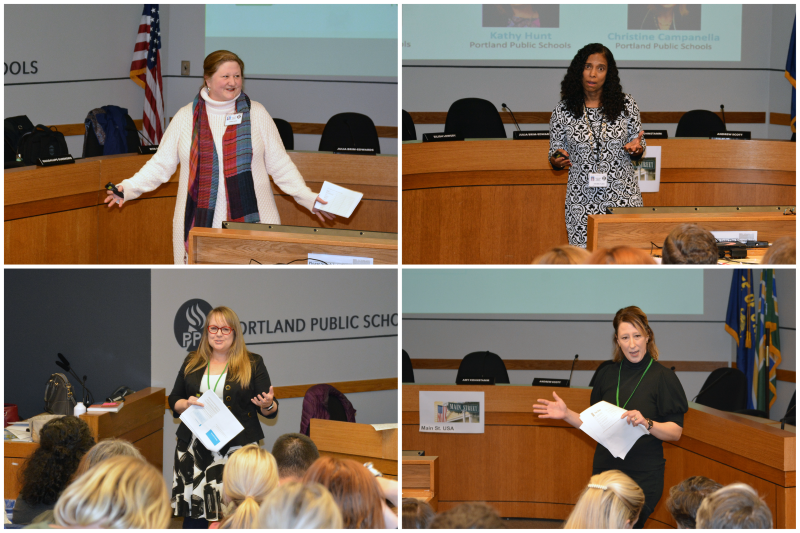-
$2.8 million grant will help PPS shape math instruction for K-5 students
1/13/2020
The DLTP program is led by (clockwise from top left) PPS's Sarah Davis, Senior Director of STEAM, and Rose Palmer, Teacher on Special Assignment for PK-5 instructional math; Chandra Lewis of RMC Research; and Nicole Rigelman, a professor in Portland State's Curriculum and Instruction Department.

The DLTP program is led by (clockwise from top left) PPS's Sarah Davis, Senior Director of STEAM, and Rose Palmer, Teacher on Special Assignment for PK-5 instructional math; Chandra Lewis of RMC Research; and Nicole Rigelman, a professor in Portland State's Curriculum and Instruction Department.
CLOSEThe project is called Developing Leaders, Transforming Practice – or DLTP. While the name might imply a complicated academic process, the project’s goal can be summed in the words of Portland State University professor Nicole Rigelman: “Deeper understanding of math for your children.”
Portland Public Schools, in partnership with Portland State and RMC Research, is undertaking DLTP, a four-year project to use research and data to shape math instruction for PPS students in kindergarten through fifth grade. The project is being funded by a $2.8 million grant from the National Science Foundation.
The project will identify which instructional model works best for K-5 math in PPS, with four models being evaluated at 12 PPS elementary schools (three schools per model). DLTP is being led by Rigelman, a professor in PSU's Curriculum and Instruction Department; PPS's Sarah Davis, Senior Director of STEAM, and Rose Palmer, a Teacher on Special Assignment for PK-5 instructional math; and Chandra Lewis of RMC, which conducts evaluations in education and health.
The project will help assess the most effective way for schools to utilize an Elementary Mathematics Specialist (EMS) – an educator with specialized training in math content, teaching methods and leadership. The models being evaluated include having one EMS at each grade level teach all the math; having an EMS at each grade level who trains teachers and also teaches; having a building-level EMS along with one for each grade; or having a building-level EMS train all teachers, but not teach students.
Informed by research gathered by RMC, the district will shape its K-5 math instruction in an equitable way, which could take the form of a streamlined, district-wide model, or models that serve specific needs of cohorts or individual schools. Either way, the goal remains singular:
“It’s quality instruction -- it’s very intentional, research-based and purposeful instruction,” Palmer said. “It’s supporting the teachers to be able to provide the best instruction for their students.”
For details on the four models and more information, see the DLTP webpage, or contact Rose Palmer.
By Month
- June 2025
- May 2025
- March 2025
- February 2025
- January 2025
- October 2024
- September 2024
- June 2024
- May 2024
- April 2024
- March 2024
- February 2024
- January 2024
- December 2023
- November 2023
- October 2023
- September 2023
- August 2023
- June 2023
- May 2023
- January 2023
- December 2022
- November 2022
- October 2022
- September 2022
- August 2022
- July 2022
- June 2022
- May 2022
- April 2022
- March 2022
- February 2022
- January 2022
- December 2021
- November 2021
- October 2021
- September 2021
- August 2021
- July 2021
- June 2021
- May 2021
- April 2021
- March 2021
- February 2021
- January 2021
- December 2020
- October 2020
- September 2020
- August 2020
- July 2020
- June 2020
- May 2020
- April 2020
- March 2020
- February 2020
- January 2020
- December 2019
- November 2019
- October 2019
- September 2019
- August 2019
- June 2019
- May 2019
- April 2019
- March 2019
- February 2019
- January 2019
- December 2018
- November 2018
- October 2018
- September 2018
- August 2018
- July 2018
- June 2018
- May 2018
- April 2018
- March 2018
- February 2018
- January 2018
- December 2017
- November 2017
- October 2017
- September 2017
- August 2017
- July 2017
- June 2017
- May 2017
- April 2017
- March 2017
- February 2017
- January 2017
- December 2016
- November 2016
- October 2016
- September 2016
- August 2016
- July 2016
- June 2016
- May 2016
- April 2016
- March 2016
- February 2016
- January 2016
- December 2015
- June 2015


